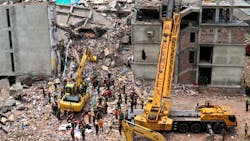Bangladesh, ILO Launch $24 Million Factory Safety Campaign
DHAKA - Bangladesh and the International Labor Organization (ILO) will launch a $24 million safety campaign Tuesday in the latest effort to overhaul appalling conditions at the nation's clothing factories, officials said.
Experts will conduct safety inspections at more than 1,000 factories as part of the multi-year campaign, after a garment factory collapse in April that killed 1,132 people highlighted inadequate safety standards in the industry.
The campaign will target factories that operate as sub-contractors or produce garments for lesser-known Western retailers, and have not signed up to safety accords established since the disaster.
"We want to bring the number of industrial accidents to a tolerable limit," Labor and Employment Secretary Mikail Shipar said. "There will be zero tolerance to poor working conditions in our factories."
The collapse of the Rana Plaza building, where workers toiled for long hours and poor pay to make clothes for Western retailers, focused attention like never before on factory conditions in Bangladesh, the world's second largest garment producer.
A fire at the Tazreen garment factory in Dhaka killed 111 workers last November, the country's worst such tragedy, and revealed unauthorized sub-contracting of orders from Western groups.
Many EU retailers have signed up to a new safety accord since the April disaster, pledging improved conditions at factories, while U.S. retailers have launched a separate pact.
Targeting Factories Not Already Inspected
The ILO and the Bangladesh government will sign an agreement later Tuesday for the $24 million inspection campaign to be funded jointly by the Dutch, British and Canadian governments, Shipar said.
He added that the campaign would target about half of Bangladesh's 4,500 factories, while the ILO said some 1,200 plants would be scrutinized.
"The experts will make preliminary assessments of the structural integrity and fire safety of between 1,000 and 1,250 garment factories," ILO official Lejo Sibbel said.
Thirty teams led by experts from the Bangladesh University of Engineering and Technology (BUET), the country's top engineering institution, would carry out the inspections, Shipar said.
"Our inspections will mostly cover mid-level and sub-contracting factories. They are the most accident prone," he said.
"Since we have limited resources, our drive will be concentrated on the factories not being inspected by top European and American retailers."
Bangladesh has carried out some safety inspections since the Tazreen and Rana Plaza tragedies, but there have been too few government inspectors of which many lack the necessary technical expertise.
A BUET survey conducted after the April disaster found about 90% of the buildings housing factories in Bangladesh were structurally unsafe.
Copyright Agence France-Presse, 2013
About the Author
Agence France-Presse
Copyright Agence France-Presse, 2002-2025. AFP text, photos, graphics and logos shall not be reproduced, published, broadcast, rewritten for broadcast or publication or redistributed directly or indirectly in any medium. AFP shall not be held liable for any delays, inaccuracies, errors or omissions in any AFP content, or for any actions taken in consequence.
